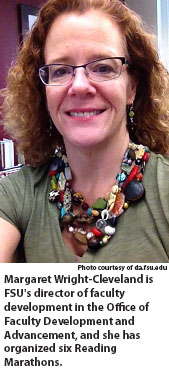Fostering courage at the Reading Marathon
 Once a year, right past the turnstiles of Florida State University's massive Strozier Library, something unusual is heard: the sound of a story being read.
Once a year, right past the turnstiles of Florida State University's massive Strozier Library, something unusual is heard: the sound of a story being read.
The annual 24-hour Reading Marathon is scheduled for February 15 and 16, the sixth time Strozier Library has hosted the nonstop round of storytelling. Professors, university community members, student athletes, even scholars who are currently studying abroad, will take part in this year's event.
In past years, readers recited novels such as Moby-Dick and Anna Karenina from start to finish, in multiple languages by a variety of readers. This year, readers will select fables, fairy tales, and myths to broadcast from the podium.
 Event coordinator Margaret Wright-Cleveland says she chose the theme because "the stories may seem simple, but they help us understand our world, ourselves, each other and what it takes to get along."
Event coordinator Margaret Wright-Cleveland says she chose the theme because "the stories may seem simple, but they help us understand our world, ourselves, each other and what it takes to get along."
"Hearing and telling them aloud, in their older forms, will help us pay attention to the power storytelling wields in shaping individuals and communities," she told news.fsu.edu.
Wright-Cleveland originally earned her Ph.D. from FSU in American Literature in 2009. She had been working part time for the university since 2003, when she decided to start her own studies again after her fourth child had turned 2. She organized the first marathon when she was teaching an upper-level English course as an adjunct professor.
"I was convinced that none of my students had ever really read Moby-Dick when I assigned it," says Wright-Cleveland, from her office at the Office of Faculty Development and Advancement, where she is the director of faculty development. "It's a tradition to read this book aloud, and there are places in the U.S. that still do. I thought, why not do that here?"
Moby-Dick reading marathons occur at places such as the Mystic Seaport Museum in Connecticut and the New Bedford Whaling Museum in Massachusetts, and Wright-Cleveland put together her own version to get her class involved in the text. The class Wright-Cleveland was teaching had about 30 students in it, but she managed to recruit many others for the first marathon.
"I had never planned on doing it again," she says. "Except at the end, several people came up to me and asked when the next reading was."
The overwhelming response she got from her students also wowed her. All of them attended the event for at least an hour, and most of them joined in to read part of Herman Melville's classic.
Her students weren't the only ones to participate, though. Fellow faculty members and students from other classes were urged to stop by, if only to listen.
Biology and engineering students who had no connection to the English department "came to the library in the middle of the night to study and would end up pausing at our reading," says Aryn Bradley, one of Wright-Cleveland's former students. "Many of them even volunteered to read."
By the time the last word of Melville's novel had been spoken, more than 100 different readers had taken part in what would become a new tradition.
Since then, the Reading Marathon has blossomed into an annual institution at FSU and has become larger in scale with each passing year. This means more work for Wright-Cleveland and her second-in-command, Michelle Demeter, who has been helping Wright-Cleveland since the beginning. Demeter works as the Distance and Outreach Coordinator for the university's libraries, and is more than happy to help.
"The first event was a lot of fun, and it encourages collaboration from several groups on campus," she says.
With the scale of the marathon increasing, Demeter has to make sure there is enough space and seating available for participants and onlookers alike.She also has the task of setting up Skype, so that the university's international campuses in Florence, London, Panama, and Valencia can participate.
Since reading is done in shifts, there are blocks of time designated for those studying abroad. Students and faculty abroad are encouraged to read in the language they feel most comfortable speaking, to help create a welcoming environment for anyone who might want to contribute.
The logistics Demeter has to deal with are more complicated this year with readers choosing their own stories, but says it's worth it to put timid readers at ease and "see students hesitant to read change their mind."
Wright-Cleveland stays at the marathon for its full duration.
"I'm there to make sure everyone feels comfortable," she says. "Not everyone reads at the same level or speed, but it's important to make whoever is reading feel welcome."
It is clear this event is not meant to target just book lovers, but instead draw in a much wider demographic: story lovers.
"We all have different pockets of knowledge," Wright-Cleveland says. "But sometimes we're worried about presenting our perspective."
Participating in the marathon took the anxiety out of public speaking for Demetrius Burse, another one of Wright-Cleveland's former students, and others.
"I've known people who have gone through college with no experience speaking in front of people," Burse says, "but being able to do so is essential later on."
Wright-Cleveland and Demeter put in plenty of work to be prepared for this year's marathon, and they are ready for the challenge. Wright-Cleveland is taking risks with a hectic reading schedule, but she does it because she wants students to follow her lead.
"Failure is important, it's how we learn and improve ourselves," she says.
She says no one should feel embarrassed, but that we should all try things we're scared to do. The Reading Marathon is just another way for her to let students and faculty members alike see the value in their own unique skill sets and points of view.
The Reading Marathon begins at 9 a.m. February 15, and will last until 10 a.m. February 16. The event takes place on the main floor of Strozier Library, just outside of Special Collections. Volunteers and interested readers can select their favorite tale and sign up for a time to read at signup.com/go/ozCEMJ.
Van Williamson is a junior majoring in English, with a concentration in editing, writing, and media. Information from news.fsu.edu contributed to this article.

